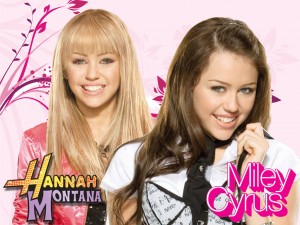
If you live in a world mostly devoid of children, you may have missed the phenomenon of Disney’s Hannah Montana®. In short, it is an jejune1 television show featuring jejune1 songs and jejune1 writing starring the child of one achy-breaky heart.
AND IT IS AN INTERNATIONAL GIGA-HIT
There’s the successful television show, the multiple-platinum albums, the 3D concert film, and the logo and branding on food, clothing, and shelter. Talk to any girl from 3 to 12 and chances are she has an intimate knowledge of the Hannah Montana empire. And don’t forget their parents, who will go to amazing lengths and pay hundreds if not thousands of dollars to take their children to a “concert”.
So, why does such a financially successful enterprise need to be redeemed? Parents and politicians like it because it is family-friendly, kids like it because it is geared specifically towards them by teams of marketers from “All Disney Business Segments“. It’s running parallel to the behemoth that is High School Musical, but skewing younger (though HSM still skews pretty young, because most people who have actually been to high school would never want to immortalize it in squeaky-clean musical numbers featuring Hanson-lite. Nirvana songs, on the other hand…)
Why, again, does it need to be redeemed? Well, because it is garbage. Most of the television show is recycled sitcom tropes from the past 50 years of television. Most of the music is boring formula-pop with occasionally bits of plastic country thrown in to keep Billy Ray attuned. It’s another example of Disney’s lowest-common-denominator formula for pop stardom. You know, the one that makes a big deal about a teenage girl, promotes her to no end, and then, once she’s old enough to make her own decisions, throws her off the island to die. (You want examples? How about Hilary Duff, Lindsay Lohan, Britney Spears for starters?)
So we’ve got this garbage that’s worth millions if not billions. This garbage is insanely popular; it has grasped the cardiovascular system of the States. Children are devoted to this show, this character, this person.
(You might say, “Ryan, Lots of people don’t think it is garbage and would be likely insulted by hearing it called that.” Well, lots of people also love reality television shows, so they have lost their vote.)
Anyway, redeeming Hannah Montana: The crux of the television show is the dual life that the star must lead. You see, young Miley Cyrus Stewart is a regular girl by day and international pop sensation Hannah Montana by night. Right there, in the basic plot synopsis are two unique features to this show:
1. International pop sensations are fake people.
2. Those people who have to be fake have a real person hiding out behind them.
Both of these points make pretty excellent truths for kids to know. Famous people are often looked up to as role models, but everyone forgets that real, actual people who lead real, actual lives have to front this stuff. This show exhibits the façade inherent in the industry and I think that is, in and of itself, worthy of some applause.
The show and music still suck, though.
What can be done? Well, the Miley Stewart/Hannah Montana dichotomy (it is a trichotomy if you take into account that Miley Cyrus herself is also a public figure) echoes the classic Man vs. Himself (in this case, Woman vs. Herself) foundation of classical literature. Even taking just pop-culture into account, there are a number of brilliant modern examples of this: Batman (and most superheroes in general), Fight Club, and pretty much any film written by Charlie Kaufman.
Why can’t Hannah Montana go in this direction? Why can’t Miley explore existentialism from the framework of her stardom?
It doesn’t have to be done in too much of a dark and violent way (…Frank Miller stops salivating and walks away) but it can done in a way that permeates the franchise, bringing a whole other dimension to Hannah Montana. She can subtlely explore the idea of self and work out, onscreen, what nearly every child goes through as they transmogrify from child to adult during their pre-teen, tween, teen years and beyond. Since this is exactly the target audience for the show, a failure to explore this facet is a serious disservice to not only fans of the show but to our culture as a whole, and its health for the next generation.
Right now, Hannah Montana shows us that it is okay to be duplicitous if it’s funny and you’re famous. But it could show us more about what it means to be a human being.
1 Did I use jejune way too much here? Probably. Did my repetitive use of it make it dull or childish or unfulfilling? GOOD.
Comments
3 responses to “Redeeming Hannah Montana”